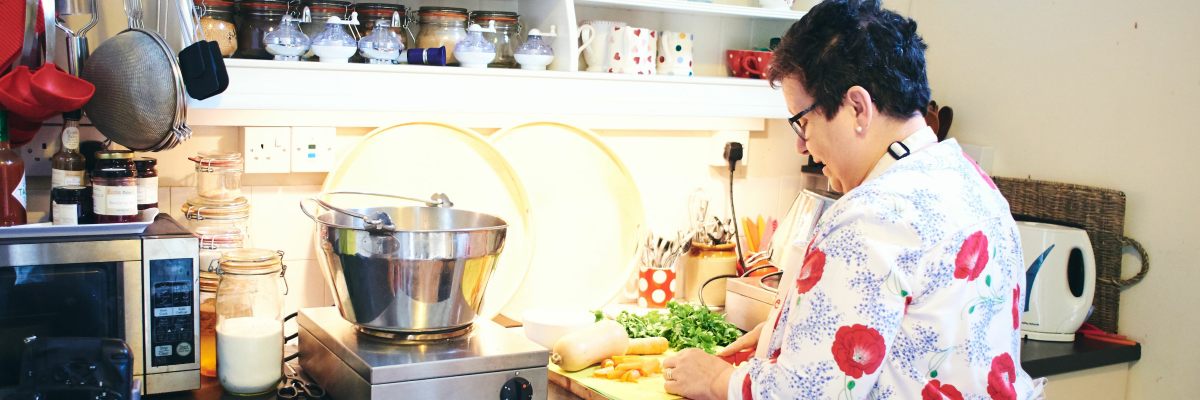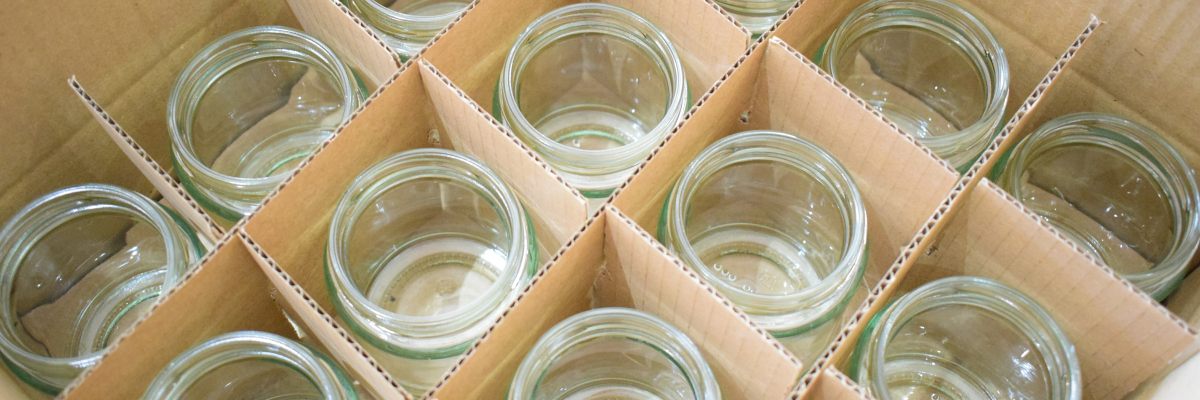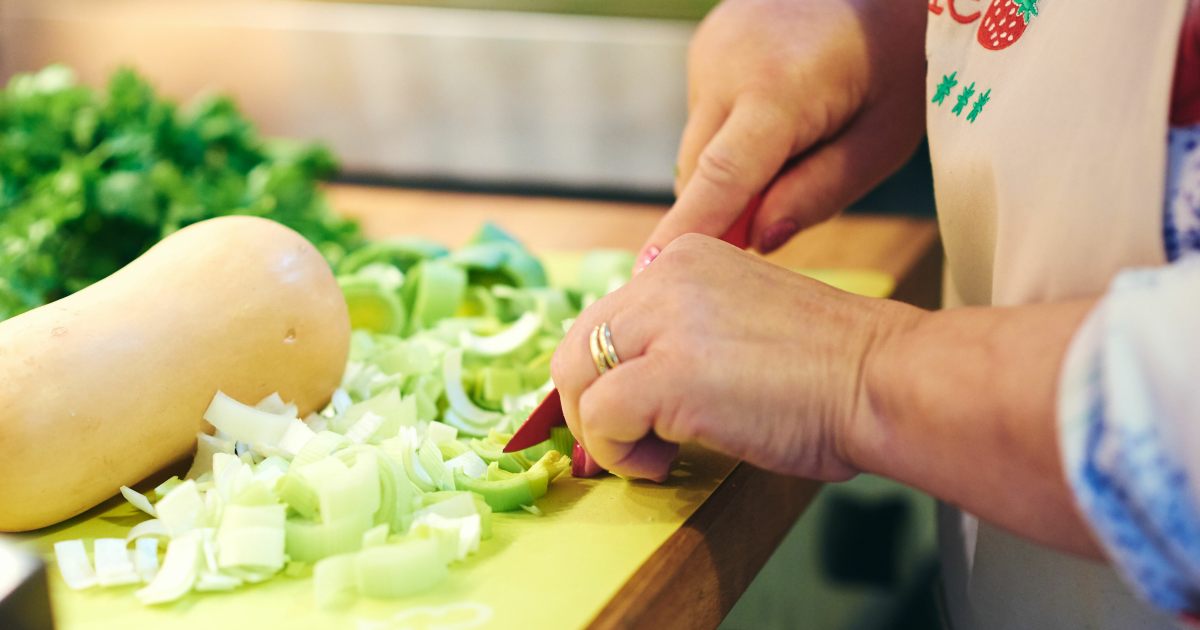So, You Are Thinking of Scaling Up?
I know what you are going through
I have done it!
I am still doing it!
There are undoubtedly pitfalls but with my support and experience you can learn not to fall into many of them.
The secret is to take each stage one at a time and then it isn't so daunting.
I have been making preserves since I was eleven years old but was fortunate enough to make it my job around twenty years ago.
My 'Big Hobby' grew fairly rapidly once the decision to expand was made. I started with local shows and markets then graduated to large National food fairs. I won awards, I was written about in National magazines - started The Guild of Jam & Preserve Makers to help others . . . but there was more to do.
It was then that I decided to consolidate everything by selling jars to other jam makers. In those days it was very difficult to buy empty jars as home production was considered to be served adequately by re-cycling and artisan production was hardly a thing. In those days it was very hard to buy empty jars and lids and I reasoned if I was buying them wholesale for me I might as well sell some of them on. Pretty soon I was too busy with jars sales to travel to fairs - which were in any case becoming prohibitively expensive - so I went into making for local outlets, demonstrating and face to face teaching. This has since morphed again into no fairs or face to face demonstrations but a large offering of both live and recorded Workshops on all aspects of preserving via, Rosie's Preserving School.
I have made pretty much every mistake going so I thought I would put this to good use by helping you to avoid them. Preserve making is one of the most satisfying things you can spend your time doing. So, come with me and let me take you through
My Top Ten Tips for Taking your Big Jam Hobby
to the Next Level (catchy title Rosie)
1. REGISTER AS A FOOD PRODUCER WITH YOUR LOCAL AUTHORITY
It is best to keep the authorities onside right from the start. They can be very helpful so ask them questions and pick their brains.
The forms are simple to complete and there isn't a fee.
At the same time, make contact with your local Environmental Health Officer. They are also a mine of information regarding the Law and Local By-laws. Sometimes their
requests can seem ridiculous but there is always a reason for it so try to comply without arguing too much!
Sometimes there is such a backlog of work they will not be able to come and see you. You can still go ahead and get your business going providing you know what the regulations are and that you exercise due diligence.
Download and study a copy of the Jam & Similar Products Regulations 2003 which covers the compositional requirements for Jam & Similar Products and needs to be followed when developing recipes. Your Granny's old recipe won't necessarily comply with modern regulations! Each of the devolved governments in the UK have their own version and you should follow whichever applies to your area.
2. AIM TO HAVE SEPARATE PREP AND COOKING AREAS,
PLUS SEPARATE UTENSILS AND PANS
Do yourself a favour and arrange to have a dedicated production area if at all possible. As a minimum you must have separate hand washing facilities. Be extra vigilant if you have pets - shedding fur and their little 'passengers' can spread further and wider than you could ever imagine.

3. INSURANCE
Now you are thinking of selling your products you must have, as a minimum Public Liability insurance cover - there are all sorts of things that could do wrong and you do need to be covered.
You also need to look at using your family car for deliveries etc. There may be clauses that you need to comply with.
Similarly your house insurance - if you are making from home - may have clauses that you need to be aware of.
4. MAKE DECISIONS EARLY ON THE
'LOOK AND FEEL' OF YOUR BUSINESS
Your branding is too important to just drift into. In the early days it can be a lot of work but you will be thankful for it later.
If possible, have a name that is unique to you - a made up word is best - so that it can't be copied easily by others. Believe me, there are lots of wolves out there who will interact with you dressed in sheep's clothing. Learn from the big boys - Tesco, Aldi, Lidl etc cannot be claimed by any other business as theirs.
Decide on the range and sizes of the jar you would like to use - make sure that it isn't going out of production. Research packaging - don't be defeated by something simple like not having the right box.
Look at what others do - emulate the best, discard the rest.
5. CERTIFICATES - MAKE SURE THEY ARE IN PLACE
AND KEPT UP TO DATE
Take the Food Hygiene Certificate at the minimum level as the bare minimum - that is the legal requirement for artisan preserve production. You must make sure that it is kept up to date. One person in a facility must have the qualification but it is best practice for anyone who works in the production area of your business to also take the exam. There are readily available providers on-line and you will need to set aside 2-3 hours to complete.
Familiarise yourself with all regulations connected to the manufacture, labelling and the sale of preserves in your marketplace e.g. the UK.
6. AVOID EMPLOYING OTHERS FOR AS LONG AS POSSIBLE!
Try to avoid employing other people to start with - they take up a disproportionate amount of your time. You have to factor in training, cost, supervison - and deputising for them when they are:-
a) ill
b) their children are ill
c) they are on holiday
d) they are on maternity/paternity leave or
e) called for jury service
f) on lunch and statutory tea breaks
g) statutory national holidays which you will find are used to extend annual leave allocations ( just when you are busiest )
Most of these have been my experience, on a regular basis. You have to weigh against that what they will actually produce for you - is it to the same standard that you would like to maintain?
One of my employees, left to her own devices when I grabbed a welcome day off, made batches of the required product altering the recipe as she did so. She explained that she didn't like some of the ingredients so didn't use them . . . .
Does their cost leave enough profit to make it worthwhile - you have probably got to where you are by not costing in your time and it comes as something of a shock to discover what the potential costs are e.g. paid annual leave
It might be better, in the earlier days, to research equipment that will make your own production more streamlined, once purchased it won't be a continual cost, and will work around the clock if needed. Some companies specialise in leasing the bigger bits of kit which is worth looking at.

7. LABELLING
As well as deciding on the branding of your products - you must be aware of, and implement the labelling laws of the country you are producing in. If you intend to export you will probably need professional advice to ensure you meet the importation rules of the country you are sending to. Most have robust regulations about the importation of food.
For production in the UK you should refer to the Food Information to Consumers Act 1169/2011 which should be applied in conjunction with Jam Regulations above in respect of the Reserved Descriptions.
There is a lot to consider and it isn't sufficient to 'just copy what the supermarkets do' .
Reference to our Business Training Part 1 & 2 Workshop goes into a full explanation and as it is your responsibility to get it right, the Workshop is a good investment. You will find the recordings in The Library of Rosie's Preserving School. Trading Standards are there for official back up for what they will or will not accept and are available for advice at their current hourly rate. You local Officer will likely have personal preferences on his/her interpretation, which you just need to comply with. The Officers are autonomous and won't necessarily agree with each other!
By Law, as a minimum you must take a refractometer reading for all new jam recipes and record the sugar content of the product on your labels. There are many on the market in all price ranges. The simpler 'manual' unit is fine if it is just you using it. It has to be initially calibrated to your vision ( simple ) and if others are going to be using it there would be a need to calibrate each time. Either have one unit per person or opt for the far more expensive digital type. Be sure to buy one that reads to the Brix table - one that is capable of measuring sugar content and is suitable for jam makers. All I will say is that you get what you pay for.
We have a make that we offer for sale on our website that we have found to be reliable and good value for money.
8. ECONOMIES OF SCALE
Buy as big as you can as few times as possible to maximise discounts - not only with jars and ingredients, but cleaning products, and stationery supplies like labels. Be aware that sugar is completely inert and is the only product that is sold without a date for use. If you have somewhere to store it that is dry then keep the stocks up. It used to be that great savings were only to be made by joining a Trade Warehouse. These days, many of the chain supermarkets can match or better the prices, and there are also very good offers on-line. Do you homework on prices and stock up when you can. Factor in having bulky items delivered - it will save you loads of time ( therefore money ) in preventing costly trips to the stores.

9. FORGE GOOD RELATIONSHIPS -
IT WILL SAVE YOUR BACON ONE DAY!
Get to know your key suppliers and treat them as well as you would like to be treated. It is a false economy to keep shopping around for the cheapest price because one day you will need someone to go that extra mile for you. Someone will have forgotten to put in the jar order, or you have a big order to fulfil suddenly from one of your customers and you need some special ingredients - whatever it is, they will be a game-changer in an emergency.
Pay on time and they will reward you with discounts, maybe offer bargains to you first. Learn what they can do, what there parameters are, how soon they usually deliver, and why these things sometimes cannot be changed. The supplier likes to make their customer happy, they know they are a key player in your success and like to feel they have played their part efficiently. If they say that something is just not possible - it is of no value to threaten to change suppliers - a new supplier who doesn't know you or understand your business often cannot help either and then you have to start all over again.
We are Love Jars - and we mean it!
10. REWARDS
Live your Dream.
The reality of running your own business is that it is really hard work, often lonely and, generally speaking, full of anxiety and imposter syndrome. However, the rewards are great - freedom to make your own decisions ( stay in bed all day? never!) satisfaction from creativity, flexibility to work around possible family requirements and, you never know - you might just make some money!
Don't be put off by other's negativity because the reality of running your own business day to day is easier than you think. If you don't know the answer to something - find someone who does! One day, you will be that person so never hold back from giving someone else a hand up when they need it.
SUMMARY
So that hopefully is enough to get you started on the right path, there is so much more to learn and to know but at least there are a few signposts. Join the on-line Groups that can help you out when you need it and always check out the resources in Rosie's Preserving School or get in touch - and
GOOD LUCK!

